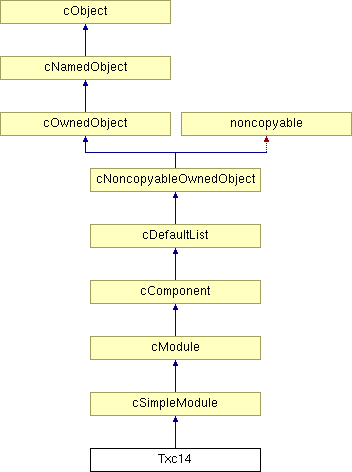Txc14 Class Reference
Inheritance diagram for Txc14:

Protected Member Functions | |
| virtual TicTocMsg14 * | generateMessage () |
| virtual void | forwardMessage (TicTocMsg14 *msg) |
| virtual void | updateDisplay () |
| virtual void | initialize () |
| virtual void | handleMessage (cMessage *msg) |
Private Attributes | |
| long | numSent |
| long | numReceived |
Detailed Description
In this step we keep track of how many messages we send and received, and display it above the icon.
Member Function Documentation
| void Txc14::forwardMessage | ( | TicTocMsg14 * | msg | ) | [protected, virtual] |
Referenced by handleMessage().
00104 { 00105 // Increment hop count. 00106 msg->setHopCount(msg->getHopCount()+1); 00107 00108 // Same routing as before: random gate. 00109 int n = gateSize("gate"); 00110 int k = intuniform(0,n-1); 00111 00112 EV << "Forwarding message " << msg << " on gate[" << k << "]\n"; 00113 send(msg, "gate$o", k); 00114 }
| TicTocMsg14 * Txc14::generateMessage | ( | ) | [protected, virtual] |
Referenced by handleMessage(), and initialize().
00086 { 00087 // Produce source and destination addresses. 00088 int src = getIndex(); // our module index 00089 int n = size(); // module vector size 00090 int dest = intuniform(0,n-2); 00091 if (dest>=src) dest++; 00092 00093 char msgname[20]; 00094 sprintf(msgname, "tic-%d-to-%d", src, dest); 00095 00096 // Create message object and set source and destination field. 00097 TicTocMsg14 *msg = new TicTocMsg14(msgname); 00098 msg->setSource(src); 00099 msg->setDestination(dest); 00100 return msg; 00101 }
| void Txc14::handleMessage | ( | cMessage * | msg | ) | [protected, virtual] |
Reimplemented from cSimpleModule.
00056 { 00057 TicTocMsg14 *ttmsg = check_and_cast<TicTocMsg14 *>(msg); 00058 00059 if (ttmsg->getDestination()==getIndex()) 00060 { 00061 // Message arrived 00062 int hopcount = ttmsg->getHopCount(); 00063 EV << "Message " << ttmsg << " arrived after " << hopcount << " hops.\n"; 00064 numReceived++; 00065 delete ttmsg; 00066 bubble("ARRIVED, starting new one!"); 00067 00068 // Generate another one. 00069 EV << "Generating another message: "; 00070 TicTocMsg14 *newmsg = generateMessage(); 00071 EV << newmsg << endl; 00072 forwardMessage(newmsg); 00073 numSent++; 00074 00075 if (ev.isGUI()) 00076 updateDisplay(); 00077 } 00078 else 00079 { 00080 // We need to forward the message. 00081 forwardMessage(ttmsg); 00082 } 00083 }
| void Txc14::initialize | ( | ) | [protected, virtual] |
Reimplemented from cComponent.
00039 { 00040 // Initialize variables 00041 numSent = 0; 00042 numReceived = 0; 00043 WATCH(numSent); 00044 WATCH(numReceived); 00045 00046 // Module 0 sends the first message 00047 if (getIndex()==0) 00048 { 00049 // Boot the process scheduling the initial message as a self-message. 00050 TicTocMsg14 *msg = generateMessage(); 00051 scheduleAt(0.0, msg); 00052 } 00053 }
| void Txc14::updateDisplay | ( | ) | [protected, virtual] |
Referenced by handleMessage().
00117 { 00118 char buf[40]; 00119 sprintf(buf, "rcvd: %ld sent: %ld", numReceived, numSent); 00120 getDisplayString().setTagArg("t",0,buf); 00121 }
Member Data Documentation
long Txc14::numReceived [private] |
Referenced by handleMessage(), initialize(), and updateDisplay().
long Txc14::numSent [private] |
Referenced by handleMessage(), initialize(), and updateDisplay().
The documentation for this class was generated from the following file:
 1.6.3
1.6.3